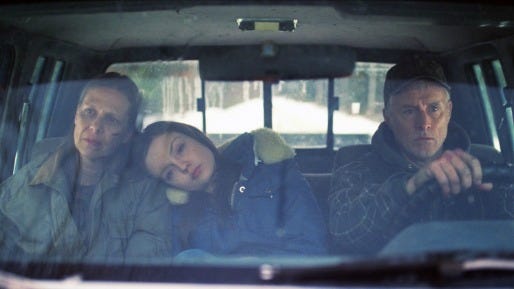Bluebird

For an Indy Film Fest schedule and showtimes, click here.
There's a stillness to "Bluebird" that bespeaks of a mature filmmaking voice, one that understands not every silence must be filled, and that sometimes a lack of action can be more profound. It's only more surprising, then, that this is Lance Edmands' first feature film as a writer/director.
Set in the frozen hinterlands of his native Maine, "Bluebird" features terrific performances from a number of recognizable veteran actors, including Amy Morton, John Slattery, Margo Martindale and Adam Driver.
The film reminds me a lot of "Winter's Bone," in which people in a fairly remote and sheltered community react to something terrible happening among them, and how one woman in particular sees her life changed. "Bluebird" is less reliant on plot, though, and spreads the emotional impact of the events amongst more characters.
Morton plays Lesley, a workaday school bus driver. When she's later asked how she picked this job, she replies matter-of-factly that the work isn't too hard, the hours aren't bad and she's always loved children. It beats working a register, she states.
Her husband is Richard (Slattery), who works for a tree-cutting company that feeds the local paper mill. The mill is about to be liquidated, news he hasn't shared with his wife or anyone else, but you can feel the impending deadline weighing on him despite his pains to appear nonchalant.
Their daughter is Paula (Emily Meade), a fairly typical 17-year-old who agitates under her parents' yoke, works an after-school job in retail and cuts up a little with her friends — though by most standards, she's a well-behaved kid.
Lives are upended when Lesley starts the day after a particularly cold winter night and finds a boy unconscious in one of the back seats of her bus. He's been there all night and is hypothermic. The authorities are called and he lives for now, but is at risk for death, permanent coma or brain damage.
It's unclear how Lesley could possibly have missed a boy slumped against a window; Edmands shows her going from seat to seat after her shift the night before, picking up stuffed animals and other lost items. Was she that distracted? Was he hiding? Did he sneak back on afterward and fall asleep?
Answers are hard to find. But the subsequent events expose every flaw hidden in this quiet little family, as Lesley must stay home and find a purpose to her life while waiting to see what will happen to her.
Moving in parallel to this family's story is another: the boy's mother and grandmother, Marla and Crystal (played, respectively, by Louisa Krause and Martindale). Marla is pretty much a party-girl loser who hadn't even realized her son was missing; he mostly lives with Crystal, and it was Marla's day to take him. But Marla was too busy getting drunk and high to take care. So what could have been an embarrassing mix-up turns potentially deadly.
Edmands is less concerned with the standard dramaturgical possibilities of this set-up — court cases, conflicts, lawsuits — than seeing how its events register on the faces and souls of his actors. Morton is amazing in her internalization of Lesley's anguish. A blue-collar family woman who's done the right thing all her life and seen little reward for it, she's not emotionally equipped to deal with the possibility of killing a tyke.
Krause has an anguished sort of charisma as Marla, whose entire life feels like a trap that's slowly encircled her with the passing of years. Martindale is her usual steady self as the long-suffering grandmother, someone who's always put others first and can't understand how her offspring could have turned out so different from herself.
In the end, I did yearn for a little more storytelling from "Bluebird," to take these characters through a few more steps down the road and see how they react. But this is an amazing debut by Lance Edmands, who looked to his own backyard for inspiration and pulled out this darkling beauty.
4 Yaps

